管理学罗宾斯第11版01
管理学罗宾斯(第11版)附加模块一知识.doc

●管理的历史背景·早期的管理:埃及(金字塔)及中国(长城);威尼斯的兵工厂(沿着运河飘浮的战舰组装线);·亚当·斯密1776年的《国富论》:组织和社会可以从劳动分工中获得经济优势·工业革命:机器对人力的取代,需要进行管理的大型组织●主要的管理方法●科学管理1弗雷德里克·泰勒——“科学管理之父”科学管理的根本目的是提高劳动生产率,提高劳动生产率的重要手段使用科学管理的方法。
科学管理的核心是要求劳资双方在心理和精神来一次彻底的思想革命。
科学管理理论——使用科学的方法来确定完成一项工作的最佳方式2弗兰克砌砖实验3吉尔布雷斯夫妇首次采用精密的计时装置来研究工人手部和身体的动作,以减少不必要的动作。
对此,还设计了一种分类方法,归纳了17种基本的手部动作,称为动素。
●一般管理理论着重研究管理职能和整个组织结构1.亨利·法约尔:“现代经营管理之父”更关注管理者的共同行为将管理行为描述为与会计、金融、生产、分销及其他典型的企业职能不同的事物提出14条管理原则:劳动分工;职权;纪律;统一指挥;统一领导;个人利益服从整体利益;报酬;集中;等级制度;秩序;公平;人员稳定;首创精神;团队精神2.马克斯·韦伯:提出了一种权力理论,该理论基于一种理想的组织类型(官僚行政组织)。
劳动分工、清晰界定的等级,详细的规章制度以及非人际关系为特征的组织形式强调理性、可预测性、非个人性、技术胜任力以及权威性缺陷:阻碍了员工个人的创造性、限制了组织对越来越动态变化的环境的快速响应能力,但对确保高效使用资源仍然有效●定量方法定量方法,也被称为运筹学或管理科学,脱胎于第二次世界大战期间用来解决军队后勤及质量控制问题的数学和统计方法。
主要采取以下方法来不断改进管理决策:统计学、优化模型、信息模型以及计算机模拟。
全面质量管理,一种专注于持续改进并回应顾客需求和期望的管理理念。
罗宾斯管理学第11版
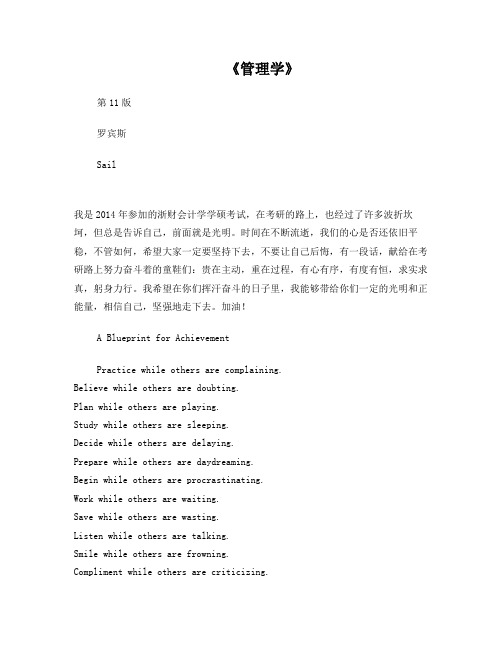
《管理学》第11版罗宾斯Sail我是2014年参加的浙财会计学学硕考试,在考研的路上,也经过了许多波折坎坷,但总是告诉自己,前面就是光明。
时间在不断流逝,我们的心是否还依旧平稳,不管如何,希望大家一定要坚持下去,不要让自己后悔,有一段话,献给在考研路上努力奋斗着的童鞋们:贵在主动,重在过程,有心有序,有度有恒,求实求真,躬身力行。
我希望在你们挥汗奋斗的日子里,我能够带给你们一定的光明和正能量,相信自己,坚强地走下去。
加油!A Blueprint for AchievementPractice while others are complaining.Believe while others are doubting.Plan while others are playing.Study while others are sleeping.Decide while others are delaying.Prepare while others are daydreaming.Begin while others are procrastinating.Work while others are waiting.Save while others are wasting.Listen while others are talking.Smile while others are frowning.Compliment while others are criticizing.Persist while others are quitting.Progress while others are lagging behind.Then, you will succeed while others are failing.目录第一篇管理导论 2第1章管理与组织领导 21.1管理者为什么对组织很重要? 21.2谁是管理者以及他们在那里工作? 21.3管理者的职能、角色和技能。
罗宾斯 《管理学》课件 第1章 管理与管理者
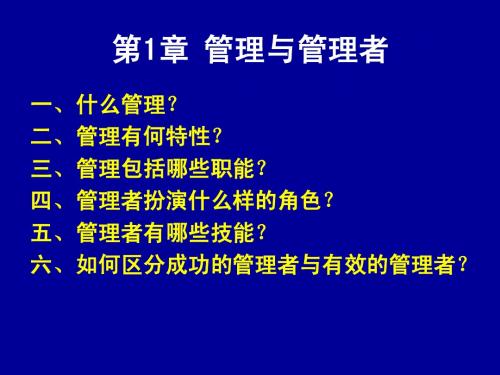
案例
今年明茨伯格(Mintzberg)来京讲演, 今年明茨伯格(Mintzberg)来京讲演, 当着上百个听众,我问他: 当着上百个听众,我问他:“你认为管理者 是天生的,还是后天训练的, 是天生的,还是后天训练的,或者既要天生 还要后天训练? 还要后天训练?” 他说: 当然是既要天生, 他说:“当然是既要天生,还要后天的 训练。因为管理既有科学,也有艺术成分。 训练。因为管理既有科学,也有艺术成分。” 我又问:如果是这样的话, 我又问:如果是这样的话,我们岂不是 告诉MBA的学生, MBA的学生 告诉MBA的学生,你们之中必然有一部分成 不了管理者!这对教MBA MBA的老师岂不是一件 不了管理者!这对教MBA的老师岂不是一件 很沮丧的事? 很沮丧的事?”
一、什么是管理? 什么是管理?
(三)教材中的定义 管理是指组织中的活动或过程: 管理是指组织中的活动或过程: 通过信息获取、决策、计划、组织、 通过信息获取、决策、计划、组织、 领导、 领导、控制和创新等职能的发挥来分 配、协调包括人力资源在内的一切可 以调用的资源, 以调用的资源,以实现单独的个人无 法实现的目标 。
一、什么是管理? 什么是管理?
(四)理解管理定义的要点: 理解管理定义的要点: 1.管理的载体是组织 管理的载体是组织; 1.管理的载体是组织; 2.管理的本质是活动或过程 分配、 管理的本质是活动或过程( 2.管理的本质是活动或过程(分配、协 调活动或过程); 调活动或过程); 3.管理的对象是一切可调用的资源 管理的对象是一切可调用的资源( 3.管理的对象是一切可调用的资源(原 材料、人员、资本、土地、厂房、设备、 材料、人员、资本、土地、厂房、设备、 顾客、信息…… ); 顾客、信息 4.管理的职能是获取信息 决策、计划、 管理的职能是获取信息、 4.管理的职能是获取信息、决策、计划、 组织、领导、控制和创新; 组织、领导、控制和创新;
(完整版)罗宾斯《管理学》内容概要,中英文对照
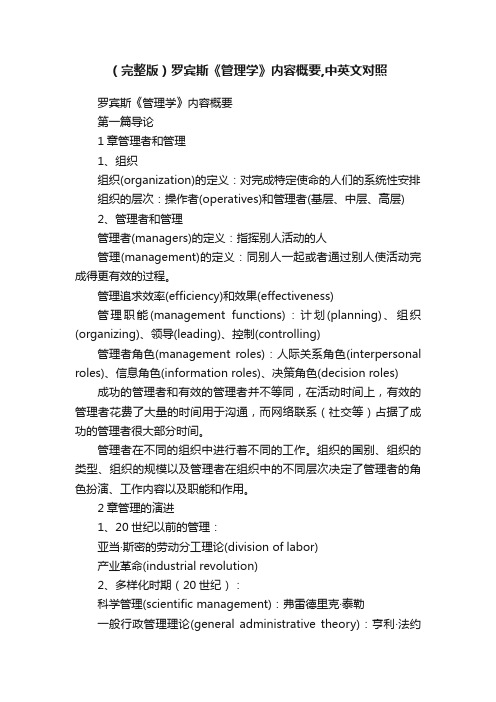
(完整版)罗宾斯《管理学》内容概要,中英文对照罗宾斯《管理学》内容概要第一篇导论1章管理者和管理1、组织组织(organization)的定义:对完成特定使命的人们的系统性安排组织的层次:操作者(operatives)和管理者(基层、中层、高层)2、管理者和管理管理者(managers)的定义:指挥别人活动的人管理(management)的定义:同别人一起或者通过别人使活动完成得更有效的过程。
管理追求效率(efficiency)和效果(effectiveness)管理职能(management functions):计划(planning)、组织(organizing)、领导(leading)、控制(controlling)管理者角色(management roles):人际关系角色(interpersonal roles)、信息角色(information roles)、决策角色(decision roles) 成功的管理者和有效的管理者并不等同,在活动时间上,有效的管理者花费了大量的时间用于沟通,而网络联系(社交等)占据了成功的管理者很大部分时间。
管理者在不同的组织中进行着不同的工作。
组织的国别、组织的类型、组织的规模以及管理者在组织中的不同层次决定了管理者的角色扮演、工作内容以及职能和作用。
2章管理的演进1、20世纪以前的管理:亚当·斯密的劳动分工理论(division of labor)产业革命(industrial revolution)2、多样化时期(20世纪):科学管理(scientific management):弗雷德里克·泰勒一般行政管理理论(general administrative theory):亨利·法约尔(principles of management)、马克斯·韦伯(bureaucracy) 人力资源方法(human resources approach):权威的接受观点(acceptance view of authority),霍桑研究,人际关系运动(卡内基、马斯洛),行为科学理论家(behavioral science theorists) 定量方法(quantitative approach)3、近年来的趋势(20世纪后期):趋向一体化过程方法(process approach)系统方法(systems approach):封闭系统和开放系统(closed systems)权变方法(contingency approach):一般性的权变变量包括组织规模、任务技术的例常性、环境的不确定性、个人差异4、当前的趋势和问题(21世纪):变化中的管理实践全球化(globalization)工作人员多样化(work force diversity)道德(morality)激励创新(innovations)和变革(changes)全面质量管理(total quality management, TQM):由顾客需要和期望驱动的管理哲学授权(delegation)工作人员的两极化(bi-modal work force)3章组织文化与环境:管理的约束力量1、组织组织文化(organizational culture)被用来指共有的价值体系。
罗宾斯管理学11版课后答案
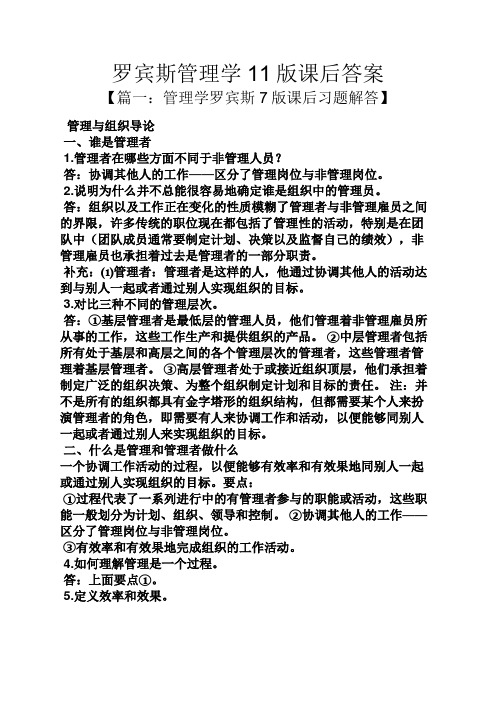
罗宾斯管理学11版课后答案【篇一:管理学罗宾斯7版课后习题解答】管理与组织导论一、谁是管理者1.管理者在哪些方面不同于非管理人员?答:协调其他人的工作——区分了管理岗位与非管理岗位。
2.说明为什么并不总能很容易地确定谁是组织中的管理员。
答:组织以及工作正在变化的性质模糊了管理者与非管理雇员之间的界限,许多传统的职位现在都包括了管理性的活动,特别是在团队中(团队成员通常要制定计划、决策以及监督自己的绩效),非管理雇员也承担着过去是管理者的一部分职责。
补充:⑴管理者:管理者是这样的人,他通过协调其他人的活动达到与别人一起或者通过别人实现组织的目标。
3.对比三种不同的管理层次。
答:①基层管理者是最低层的管理人员,他们管理着非管理雇员所从事的工作,这些工作生产和提供组织的产品。
②中层管理者包括所有处于基层和高层之间的各个管理层次的管理者,这些管理者管理着基层管理者。
③高层管理者处于或接近组织顶层,他们承担着制定广泛的组织决策、为整个组织制定计划和目标的责任。
注:并不是所有的组织都具有金字塔形的组织结构,但都需要某个人来扮演管理者的角色,即需要有人来协调工作和活动,以便能够同别人一起或者通过别人来实现组织的目标。
二、什么是管理和管理者做什么一个协调工作活动的过程,以便能够有效率和有效果地同别人一起或通过别人实现组织的目标。
要点:①过程代表了一系列进行中的有管理者参与的职能或活动,这些职能一般划分为计划、组织、领导和控制。
②协调其他人的工作——区分了管理岗位与非管理岗位。
③有效率和有效果地完成组织的工作活动。
4.如何理解管理是一个过程。
答:上面要点①。
5.定义效率和效果。
答:①效率是指以尽可能少的投入获得尽可能多的产出。
通常指的是“正确地做事”,即不浪费资源。
②效果通常是指“做正确的事”,即所从事的工作和活动有助于组织达到其目标。
③可见,效率是关于做事的方式;效果是指实现组织目标的程度,涉及事情的结果。
6.解释效率和效果对管理的重要性。
管理学(斯蒂芬·P.罗宾斯)(11版中文)
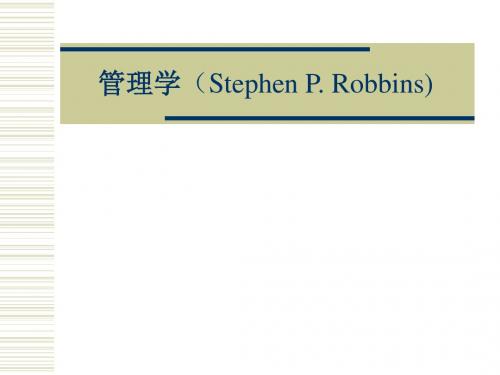
二、外部环境:约束和挑战
一般环境 具体环境 环境对管理者的影响
一般环境(1)
对所有组织都会产生影响; 组织在短时间内无法加以改变和影响而只 能适应和调整自己。 经济条件 政治/法律条件 社会文化条件 技术条件 自然条件
一般环境(2)
经济环境: 经济发展的阶段状况:萧条、停滞、 复苏、增长; 人均收入与购买力; 人口总数与市场潜力; 物价水平;基础设施;发展均衡性; 利率、汇率、投资率
管理学(Stephen P. Robbins)
第一篇 管理导论
管理与组织导论 管理史 理解管理的情境:约束与挑战
第一章 管理与组织导论
谁是管理者 什么是管理 管理者做什么 管理者工作是如何变化的 为什么要学习管理
一、谁是管理者?
他们是通过协调和监督他人的活动达到组织目 标的人 他们有着不同的称呼和头衔 他们区别于非管理者; 对绝大部分人而言,他们既是管理者,又是被 管理者 管理和被管理的主体都是“人” 管理者可以分为多种不同的层级和处于不同的 领域
附3:规范化管理的十大制度
企 业 员 工 手 册
企 文企 文企 业 标岗 准单 规企 企 企 业 件业 件业 务 准位 位 范业 业 业 文 激 业流 角 、 组组系 化 励 务程 色 部 织织统 章 机 流图 个 门 运构分 程 制 程 人 工 行架析 建 说 工 作 管图文 设 明 作 标 理 件
四、定量方法(管理科学理论)
数学和统计方法 全面质量管理
五、当代方法(管理理论)
过程方法 系统方法 权变方法
六、现代管理实践的发展
管理内涵进一步拓展 管理组织更加多样化发展 管理方法日渐科学 管理手段更加自动化 管理实践更加丰富化 管理的责任更加宽泛化
管理学罗宾斯11版中英文对照详解
第一部分•Efficiency效率P8–“Doing things right”–Getting the most output for the least inputs •Effectiveness效果–“Doing the right things”–Attaining organizational goalsThe Manager: P44Omnipotent or Symbolic?•Omnipotent View of Management管理万能论- the view that managers are directly responsible for an organization’s success or failure.认为经理直接负责组织的成功或失败•Symbolic view of Management管理象征论- the view that much of an organization’s success or failure is due to external forces outside managers’ control.认为一个组织的成功或失败大部分是由管理者控制之外的外部力量所造成的观点•What’s Your Global Perspective?全球观(全球视角)P71•Parochialism狭隘主义- viewing the world solely through your own perspectives, leading to an inability to recognize differences between people.•Ethnocentric Attitude民族中心论- the parochialistic belief that the best work approaches and practices are those of the home country.本国取向•Polycentric Attitude多国论- the view that the managers in the host country know the best work approaches and practices for running their business.东道国取向•Geocentric Attitude全球中心论–a world-oriented view that focuses on using the best approaches and people from around the globe.全球取向•Multinational Corporation (MNC)跨国公司- a broad term that refers to any and all types of international companies that maintain operations in multiple countries. 任一或所有类型的在多国维持经营的国际性公司。
管理学罗宾斯第11版02
• Symbolic view of Management - the view that much of an organization’s success or failure is due to external forces outside managers’ control.
Exhibit 2-3: Environmental Uncertainty Matrix
Who Are Stakeholders?
• Stakeholders - any constituencies in the organization’s environment that are affected by an organization’s decisions and actions.
processes often hard to decipher
Values strategies, goals, philosophies answers to questions of why
greater level of awareness
Basic Assumptions unconscious taken from grantedBiblioteka beliefs, habits of
• Environmental Complexity - the number of components in an organization’s environment and the extent of the organization’s knowledge about those components.
管理学罗宾斯(第11版)第2章知识
●决策从两个或更多备选方案中做出选择●制定决策1.确定一个问题以及决策标准,并且为每项标准分配权重2.制定和分析各种备选方案,并从中选择一项能够解决该问题的方案3.实施所选择的这项方案4.评估该决策的效果●步骤1:确定一个问题问题:使得人们难以实现理想目标的障碍问题的特征:·当管理者意识到它时,它才成为一个问题·存在解决该问题的压力·该管理者必须有必要的权力、信息或资源来解决该问题●步骤2:明确决策标准决策标准是对解决该问题具有重要意义的因素,例如:·将会导致的成本(所需的投资)·可能会面临的风险(失败的可能性)·理想的结果(公司的增长)●步骤3:为决策标准分配权重各项决策标准并不是同等重要:--决策者为每项决策标准分配权重,以确定它们在决策时的优先考虑顺序●步骤4:开发备选方案要求决策者列出切实可行的备选方案--不需要评估●步骤5:分析备选方案评估每项备选方案的优势和劣势--对每项备选方案的评估要基于已确定的决策标准及其权重●步骤6:选择备选方案选择最佳方案---选择总分最高的那个方案●步骤7:执行备选方案将所选择的方案付诸实践---将该决策传达给将执行该方案的人员,并获取他们的认同---再次评估环境是否发生变化●步骤8:评估决策的效果通过该决策的效果来判断它的合理性-- 该方案多么有效地解决了该问题?-- 如果问题仍未得到解决,是哪里出错了?●理性决策理性决策:作出符合逻辑的、前后一致的选择以实现价值最大化有限理性:决策是理性的,但这种理性被决策者处理信息的能力所限制(局限)满足:接受“足够好”的解决方案承诺升级:尽管有证据表明以前的决策是错误的,但对该决策的承诺增强了●直觉决策基于经验、感受和积累的判断力来作出决策●循证管理系统地使用可获得的最佳证据来改进管理实践四大基本要素:1决策者的专业知识和判断2已被决策者评估过的外部证据3与决策相关之人的意见、偏好和价值观4相关的组织●程序化决策Vs 非程序化决策程序化决策:可以通过某种例行方法来作出的某种重复性决策非程序化决策:独特的、非重复发生的、需要量身定制解决方案的决策●程序化决策的类型程序:管理者用来应对结构化问题的一系列连续步骤规定:告诉管理者或员工能做什么或不能做什么的明确声明政策:决策的指南●问题的类型结构化问题:直接的、常见的、容易定义和目标清晰的问题开放式问题:崭新的、不同寻常的、相关信息很模糊或不完整的问题●制定决策的条件确定性:制定决策时的一种理想情况,管理者能够制定精确的决策,因为每种备选方案的结果都是已知的。
考研备考重难点全解:分享罗宾斯的管理学(第11版)知识点
研备考重难点全解:分享罗宾斯的管理学(第11版)知识点(十八)第Ⅴ篇领导第十四章行为的基础一、为什么要了解个体行为1.界定什么是组织行为学。
答:组织行为学领域中尤其关注的是在组织中工作的人的活动。
组织行为学主要关注两大领域。
其一,组织行为学研究个体行为。
这个领域的成果主要来自心理学家的贡献,包括态度、人格、认知、学习、激励等课题。
其二,组织行为学关注群体行为,包括群体规范、角色、团队建设、领导和冲突等课题。
有关群体行为的知识主要来自社会学家和社会心理学家的工作。
群体中的个体行为与个体单独活动时的行为并不一样。
2.把组织看做"一座冰山",为什么对理解组织行为十分重要? 答:理解组织行为的困难之一在于它针对那些并非明显可见的问题。
组织犹如一座冰山--组织行为中只有很少一部分是清楚可见的,而相当大量的内容是隐藏起来的。
--①可见部分:战略、目标、政策与程序、技术、正式权威、命令链;②隐藏部分:态度、知觉、群体规范、非正式互动、个体之间与群体之间的冲突。
3.组织行为学的目的是什么? 答:组织行为学的目的在于解释、预测和影响行为。
由于管理者通过其他人而完成工作,如果它们能够了解行为,则会使管理工作更为有效。
管理者必须能够解释员工为什么表现出这样的行为而不是那样的行为,能够预测员工会对管理者所采取的各种活动作出什么样的反应,并能够进一步影响员工实施具体的行为。
管理者关心的重点是员工的生产率、出勤率和流动率,还考察工作满意度。
二、态度4.态度的三种成分是什么? 答:态度是指对于物体、人物和事件的评价性陈述,这种陈述可以是赞同的也可以是反对的,它们反映了个体对于某一对象的内心感受。
态度的三种成分分别是认知成分、情感成分、行为成分。
①认知成分由一个人所持有的信念、观点、知识或信息构成。
②情感成分是态度中的情绪或感受部分。
③行为成分是指个人以某种方式对某人或某事作出行动的意向。
把态度看成由认知、情感和行为三种成分组成,有助于我们认识到态度的复杂性。
- 1、下载文档前请自行甄别文档内容的完整性,平台不提供额外的编辑、内容补充、找答案等附加服务。
- 2、"仅部分预览"的文档,不可在线预览部分如存在完整性等问题,可反馈申请退款(可完整预览的文档不适用该条件!)。
- 3、如文档侵犯您的权益,请联系客服反馈,我们会尽快为您处理(人工客服工作时间:9:00-18:30)。
• management roles • interpersonal roles • informational roles • decisional roles • technical skills • human skills • conceptual skills • organization • universality of management
Management Roles
• Interpersonal roles
– Figurehead, leader, liaison
• Informational roles
– Monitor, disseminator, spokesperson
• Decisional roles
– Entrepreneur, disturbance handler, resource allocator, negotiator
• Explain why managers are important to organizations
• Tell who managers are and where they work
• Describe the functions, roles, and skills of managers
Exhibit 1-5: Mintzberg’s Managerial Roles
Skills Managers Need
• Technical skills
– Knowledge and proficiency in a specific field
• Human skills
– The ability to work well with other people
goals
Exhibit 1-3: Efficiency and Effectiveness in Management
Management Functions
• Planning - Defining goals, establishing strategies to achieve goals, and developing plans to integrate and coordinate activities.
– Managers should encourage employees to be aware of and act on opportunities for innovation.
The Importance of Sustainability
• Sustainability -
a company’s ability to achieve its business goals and increase longterm shareholder value by integrating economic, environmental, and social opportunities into its business strategies.
• Managerial skills and abilities are critical in getting things done.
• The quality of the employee/supervisor relationship is the most important variable in productivity and loyalty.
Exhibit 1-1: Levels of Management
Where Do Managers Work?
• Organization - A deliberate arrangement of people assembled to accomplish some specific purpose (that individuals independently could not accomplish alone).
• Conceptual skills
– The ability to think and conceptualize about abstract and complex situations concerning the organization
Exhibit 1-6: Skills Needed at Different Managerial Levels
• Common Characteristics of Organizations
– Have a distinct purpose (goal) – Are composed of people – Have a deliberate structure
Exhibit 1-2: Characteristics of Organizations
Exhibit 1-9: Universal Need for Management
Exhibit 1-10: Rewards and Challenges of Being a Manager
Terms to Know
• manager • first-line managers • middle managers • top managers • management • efficiency • effectiveness • planning • organizing • leading • controlling
Exhibit 1-4: Four Functions of Management
Management Roles
• Roles are specific actions or behaviors expected of a manager.
• Mintzberg identified 10 roles grouped around interpersonal relationships, the transfer of information, and decision making.
Exhibit 1-7: Important Managerial Skills
The Importance of Customers
• Customers: the reason that organizations exist
– Managing customer relationships is the responsibility of all managers and employees.
Who Are Managers?
• Manager
– Someone who coordinates and oversees the work of other people so that organizational goals can be accomplished.
Classifying Managers
• Top Managers - Individuals who are responsible for making organization-wide decisions and establishing plans and goals that affect the entire organization.
Exhibit 1-8: Changes Facing Managers
Why Study Management?
• Universality of Management
– The reality that management is needed
• in all types and sizes of organizations • at all organizational levels • in all organizational areas • in all organizations, regardless of location
– Consistent high quality customer service is essential for survival.
The Importance of Innovation
• Innovation
– Doing things differently, exploring new territory, and taking risks.
• First-line Managers - Individuals who manage the work of non-managerial employees.
• Middle Managers - Individuals who manage the work of first-line managers.
What Do Managers Do?
• Management involves coordinating and overseeing the work activities of others so that their activities are completed efficiently and effectively.
• Describe the factors that are reshaping and redefining the manager’s job
• Explain the value of studying management
Why are Managers Important?
• Organizations need their managerial skills and abilities more than ever in these uncertain, complex, and chaotic times.
Effectiveness and Efficiency
